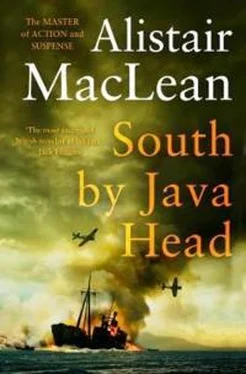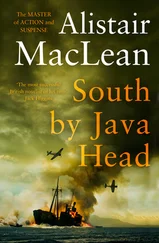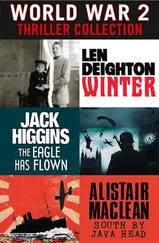Trikah, the chief was as good as his promise. Old women washed and cleaned suppurating wounds, covered them with cool, soothing pastes, covered these in turn with large leaves and bound the whole with strips of cotton. After that, all were fed, and fed magnificently. More correctly, they were given a splendid selection of food to eat – chicken, turtle eggs, warmed rice, durians, crushed prawns, yams, sweet boiled roots and dried fish: but hunger had long since died, they had lived too long with starvation to do anything but token justice to the spread before them. Besides, the paramount need was not for food, but for sleep, and sleep they soon had. No beds, no hammocks, no couch of twigs or grass: just cocoa-nut matting on the swept earthen floor of a hut, and that was enough, more than enough, it was paradise for those who had been without a night’s sleep for longer than their weary minds could remember. They slept like the dead, lost beyond call in the bottomless pit of exhaustion.
When Nicolson awoke, the sun had long gone and night had fallen over the jungle. A still, hushed night, and a still, hushed jungle. No chatter of monkeys, no cries of night birds, no sounds of any life at all. Just the hush and the stillness and the dark. Inside the hut it was hushed, too, and still, but not dark: two smoking oil lamps hung from poles near the entrance.
Nicolson had been deep sunk in drugged, uncaring sleep. He might have slept for hours longer, and would have, given the opportunity. But he did not awake naturally. He awoke because of a sharp stab of pain that reached down even through the mists of sleep, a strange unknown pain that pierced his skin, cold and sharp and heavy. He awoke with a Japanese bayonet at his throat.
The bayonet was long and sharp and ugly, its oiled surface gleaming evilly in the flickering light. Down its length ran the notched runnel for blood. At a distance of a few inches, it looked like a huge metallic ditch, and into Nicolson’s uncomprehending, half-waking mind flickered evil visions of slaughter and mass burials. And then the film was away from his eyes, and his gaze travelled with sick fascination up the shining length of the bayonet, up to the barrel of the rifle and the bronzed brown hand that held it half-way down, beyond the bolt and magazine to the wooden stock and the other bronzed hand, beyond that again to the belted grey-green uniform and the face beneath the visored cap, a face with the lips drawn far back in a smile that was no smile at all, but an animal snarl of hate and expectancy, a sneering malignancy well matched by the blood lust in the porcine little eyes. Even as Nicolson watched, the lips drew still further back over the long, canine teeth, and the man leaned again on the stock of his rifle.
The point of the bayonet went right through the skin at the base of the throat.
Nicolson felt the waves of nausea flood over him, almost like the waves of the sea. The lights in the hut seemed to flicker and grow dim.
Seconds passed and his vision gradually returned. The man above him – an officer, Nicolson could see now, he had a sword by his side – had not moved, the bayonet still rested on his throat. Slowly, painfully, as best he could without moving head or neck even a millimetre, Nicolson let his eyes wander slowly round the hut, and the sickness came back to him again. Not from the bayonet, this time, but from the bitterness, the hopelessness that welled up in his throat in an almost physical tide of despair. His guard was not the only one in the hut.
There must have been at least a dozen of them, all armed with rifles and bayonets, all with rifles and bayonets pointing down at the sleeping men and women. There was something weird and ominous about their silence and stealth and unmoving concentration. Nicolson wondered dimly whether they were all to be murdered in their sleep, and had no sooner done so when the man above him shattered the idea and the brooding silence.
“Is this the swine you spoke of?” He spoke in English, with the precise, grammatical fluency of an educated man who has not learned the language among the people who spoke it. “Is this their leader?”
“That is the man Nicolson.” It was Telak who spoke, shadowed just beyond the doorway. He sounded remote, indifferent. “He is in charge of the party.”
“Is that the case? Speak up, you English pig!”
The officer emphasised his request with another jab at Nicolson’s throat. Nicolson could feel the blood trickling slowly, warmly, on to the collar of his shirt. For a moment he thought to deny it, to tell the man that Captain Findhorn was his commanding officer, but instinct immediately told him that things would go very hard with the man whom the Japanese recognised as the leader. Captain Findhorn was in no condition to take any further punishment. Even a blow, now, could easily be enough to kill him.
“Yes, I am in charge.” Even to himself, his voice sounded weak and husky. He looked at the bayonet, tried to gauge his chances of knocking it aside, recognised that it was hopeless. Even if he did, there were another dozen waiting men ready to shoot him down. “Take that damned thing away from my neck.”
“Ah, of course! How forgetful of me.” The officer removed his bayonet, stepped back a pace and then kicked Nicolson viciously in the side, just above the kidney. “Captain Yamata, at your service,” he murmured silkily. “An officer in His Imperial Majesty’s Nipponese Army. Be careful how you speak to a Japanese officer in future. On your feet, you swine.” He raised his voice to a shout. “All of you, on your feet!”
Slowly, shakily, grey-faced beneath his dark tan and almost retching with the agony in his side, Nicolson rose to his feet. All around the hut others, too, were shaking off the dark fog of sleep and pushing up dazedly off the floor, and those who were too slow, too sick or too badly hurt were jerked cruelly upright regardless of their moans and cries and hustled out towards the door. Gudrun Drachmann, Nicolson saw, was one of those who were roughly handled; she had bent over to roll a still sleeping Peter in a blanket and gather him in her arms, and the guard had jerked them both up with a violence that must nearly have dislocated the girl’s arm: the sharp cry of pain was hardly uttered before she had bitten it off in tight-lipped silence. Even in his pain and despair Nicolson found himself looking at her, looking and wondering, wondering at her patience and courage and the selfless unceasing devotion with which she had looked after the child for so many long days and endless nights, and as he looked and wondered he was conscious of a sudden and almost overwhelming sense of pity, conscious that he would have done anything to save this girl from further harm and hurt degradation, a feeling, he had to confess to himself with slow surprise, that he could never remember having had for any other than Caroline. He had known this girl for only ten days, and he knew her better than he would have known most in a dozen lifetimes: the quality and the intensity of their experiences and suffering in the past ten days had had the peculiar power and effect of selecting, highlighting and magnifying with a brutal and revealing clarity faults and merits, vices and virtues that might otherwise have remained concealed or dormant for years. But adversity and privation had been a catalyst that had brought the best and the worst into unmistakable view and, like Lachie McKinnon, Gudrun Drachmann had emerged shining and untarnished out of the furnace of pain and suffering and the extremest hardships. For a moment and incredibly, Nicolson forgot where he was, forgot the bitter past and empty future and looked again at the girl and he knew for the first time that he was deceiving himself, and doing it deliberately. It wasn’t pity, it wasn’t just compassion he felt for this slow-smiling scarred girl with a skin like a rose at dusk and the blue eyes of northern seas: or if it had been, it would never be again. Never again.
Читать дальше
Конец ознакомительного отрывка
Купить книгу










